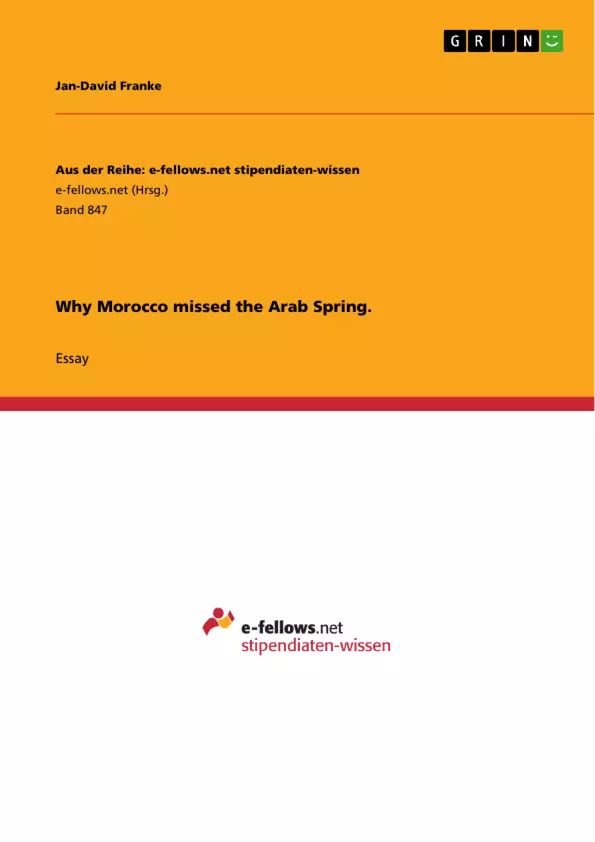In the early 2011 the people of many Arabic countries decided to no longer take the repressions that they had been subjected to for decades. Starting with the self-ignition of a young Tunisian, the call for deposition of the despots, for the granting of basic civil and human rights and thereby for democracy lead to a movement – often referred to as “the Arab Spring” - never seen before in that region of the earth. In Tunisia and Egypt the demonstrators accomplished to remove the potentates remaining peacefully despite the violent suppressions they were facing. In Lybia the rebels eventually gained power through a civil war being supported by the United Nations and the NATO. In Yemen and Syria the situation can still develop in several directions. In Bahrain endeavors have been violently nipped in the bud. Morocco, however, remains a puzzling exception. In my paper I will analyze the possible explanations the WorldValuesSurvey offers for the relatively reserved uprisings observed in Morocco. Therefore the “fundamental predispositions in favor of democratic orders”(p189) by Lasswell and especially the complementing “dogmatism scale” by Rokeach – as both discussed in Welzel (2007) - will serve as the theoretical foundation for assessing certain results given by the WVS. Rokeach’s explanatory approach can basically be seen as the reversed analysis on the same issue: Lasswell provides preconditions that facilitate democratic behavior in an individual, Rokeach measures the “closed”-mindedness that prevents democratic behavior in an individual, therefore both approaches can be perceived as complementing. I will focus my analysis on Rokeach’s dogmatism scale. The perception that an open-mindedness towards other human beings and its various manifestations plays an important role in several areas is retrievable in many fields of social science, for example Putnam5 argues that it is crucial for social capital and civicness, Inglehart that post-materialism fosters open-mindedness in social coherences.
Inhaltsverzeichnis (Table of Contents)
- Threat Perceptions
- Low Self-Esteem
- Fatalism
- Intolerance of Diversity
- A Strong Belief into Authority
- Evaluation
Zielsetzung und Themenschwerpunkte (Objectives and Key Themes)
This paper examines the potential explanations for the relatively limited protests witnessed in Morocco during the Arab Spring, drawing on the WorldValuesSurvey. Specifically, it focuses on the "fundamental predispositions in favor of democratic orders" proposed by Lasswell and the complementary "dogmatism scale" by Rokeach, as discussed by Welzel (2007), to analyze the Moroccan population's open-mindedness and potential for democratic behavior.
- The impact of “dogmatism scale” on democratic behavior in Morocco.
- The role of social trust and threat perceptions in shaping individual attitudes towards authority.
- The relationship between self-esteem and an individual's willingness to challenge existing power structures.
- The impact of fatalism on political participation and activism.
- The influence of diversity and cultural homogeneity on societal values and attitudes towards democracy.
Zusammenfassung der Kapitel (Chapter Summaries)
The paper analyzes each of the five factors within Rokeach’s “dogmatism-scale” using data from the WorldValuesSurvey. It explores how the Moroccan population's attitudes towards trust, self-esteem, fatalism, diversity, and authority relate to the concept of open-mindedness and democratic behavior. The analysis reveals a complex interplay between these factors, offering insights into why Morocco might have been relatively less affected by the Arab Spring compared to other countries in the region.
Schlüsselwörter (Keywords)
Arab Spring, Morocco, WorldValuesSurvey, dogmatism, open-mindedness, democratic behavior, threat perception, self-esteem, fatalism, diversity, authority, trust.
Frequently Asked Questions
Why did Morocco have limited protests during the Arab Spring?
The paper analyzes factors like social trust, authority beliefs, and fatalism to explain why Morocco remained a "puzzling exception" compared to countries like Tunisia or Egypt.
What is Rokeach’s dogmatism scale?
It is a psychological tool used to measure "closed-mindedness," which can prevent individuals from engaging in democratic behavior or challenging authority.
How does fatalism impact political activism in Morocco?
High levels of fatalism can lead to political passivity, as individuals may believe that events are predetermined and cannot be changed by their actions.
What role does self-esteem play in democratic orders?
According to Lasswell, self-esteem is a fundamental predisposition for democratic behavior; low self-esteem may hinder the willingness to challenge existing power structures.
How does the WorldValuesSurvey contribute to this analysis?
The WVS provides the empirical data on Moroccan attitudes toward trust, diversity, and authority, which are then assessed using theoretical frameworks.
- Arbeit zitieren
- Jan-David Franke (Autor:in), 2011, Why Morocco missed the Arab Spring., München, GRIN Verlag, https://www.hausarbeiten.de/document/264813


